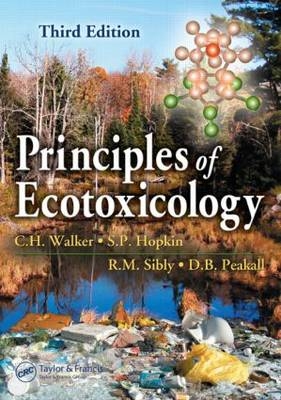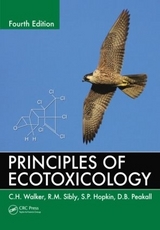
Principles of Ecotoxicology, Third Edition
Crc Press Inc (Verlag)
978-0-8493-3635-5 (ISBN)
- Titel erscheint in neuer Auflage
- Artikel merken
Presenting a multidisciplinary perspective in a concise format, Principles of Ecotoxicology, Third Edition discusses the fundamental chemical and ecological nature of pollution processes while identifying the major classes of pollutants and their environmental fate. The first edition was originally created to fill the need for a textbook that covered the basic principles of a developing and wide-ranging field and the second edition expanded on that theme. Keeping the focus on principles over practice that has made each incarnation of this textbook so popular, the third edition brings the text up to date and strengthens coverage in areas that have come to the forefront of the field.
The third edition features new material on pollutants that are receiving closer scrutiny, naturally occurring poisons, the history of chemical warfare, population risk assessment, community structure, neonicotinoids, endocrine disruption, and neurotoxicity. A new section on extrapolating from molecular interaction to the consequent population changes highlights the molecules to ecosystem approach and provides the groundwork for discussions on the employment of biomarker strategies in field studies. A major theme of the new material is how the concepts discussed can contribute to improved methods of environmental risk assessment. With updates to every chapter, this text provides essential information for students in easy to use and understandable format.
POLLUTANTS AND THEIR FATE IN ECOSYSTEMS
Major Classes of Pollutant
Inorganic Ions
Organic Pollutants
Organometallic Compounds
Radioactive isotopes
Gaseous Pollutants
Summary
Further Reading
Routes by Which Pollutants Enter Ecosystems
Entry into Surface Waters
Contamination of Land
Discharge into the Atmosphere
Quantification of Release of Pollutants
Summary
Further Reading
Long-Range Movements and Global Transport of Pollutants
Factors Determining Movement and Distribution of Pollutants
Transport in Water
Transport in Air
Models for Environmental Distribution of Chemicals
Summary
Further Reading
The Fate of Metals and Radioactive Isotopes in Contaminated Ecosystems
Introduction
Terrestrial Ecosystems
Aquatic Systems
Summary
Further Reading
The Fate of Organic Pollutants in Individuals and in Ecosystems
Fate within Individual Organisms
Organic Pollutants in Terrestrial Ecosystems
Organic Pollutants in Aquatic Ecosystems
Summary
Further Reading
EFFECTS OF POLLUTANTS ON INDIVIDUAL ORGANISMS
Toxicity Testing
General Principles
Determination of the Toxicity of Mixtures
Toxicity testing with Terrestrial Organisms
Toxicity testing with Aquatic Organisms
Risk Assessment
Toxicity Testing in the Field
Alternative Methods in Ecotoxicological Testing
Summary
Further Reading
Biochemical Effects of Pollutants
Introduction
Protective Biochemical Responses
Molecular Mechanisms of Toxicity
Examples of Molecular Mechanisms of Toxicity
Summary
Further Reading
Physiological Effects of Pollutants
Introduction
Effects of Pollutants at the Cellular Level
Effects at the Organ Level
Effects at the Whole Organism Level in Animals
Effects on Plants
Energy Costs of Physiological Change
Summary
Further Reading
Interactive Effects of Pollutants
Introduction
Additive Effects
Potentiation of Toxicity
Potentiation Due to Inhibition of Detoxification
Potentiation Due to Increased Activation
The Detection of Potentiation in the Field
Summary
Further Reading
Biomarkers
Classification of Biomarkers
Specificity of Biomarkers
Relationship of Biomarkers to Adverse Effects
Discussion of Specific Biomarkers
Role of Biomarkers in Environmental Risk Assessment
Summary
Further Reading
In situ Biological Monitoring
Introduction
Community Effects (Type 1 Biomonitoring)
Bioconcentration of Pollutants (Type 2 Biomonitoring)
Effects of Pollutants (Type 3 Biomonitoring)
Genetically Based Resistance to Pollution (Type 4 Biomonitoring)
Conclusions
Summary
Further Reading
EFFECTS OF POLLUTANTS ON POPULATIONS AND COMMUNITIES
Changes in Numbers: Population Dynamics
Population Abundance
Population Growth Rate
Population Growth Rate Depends on the Properties of Individual Organisms
Density Dependence
Identifying Which Factors are Densitivity Dependent: K-Value Analysis
Interactions Between Species
Field Studies: Three Case Studies
Modelling the Effects of Skylarks for Risk Assessment Purposes
Summary
Further Reading
Evolution of Resistance to Pollution
Chronic Pollution is Environmental Change
The Evolutionary Process in a Constant Environment
The Evolution of Resistance When There is a Mortality-Production Trade-Off
Evolutionary Responses to Environmental Change
Resistance is Often Monogenic
Case Studies
Summary
Further Reading
Changes in Communities and Ecosystems
Introduction
Soil Processes: The Functional Approach
Changes in Composition of Communities: The Structural Approach
Global Processes
Summary
Further Reading
Extrapolating From Molecular Interactions to Consequent Effects at the Population Level
Introduction
The Translation of Toxic Effects Across Organizational Boundaries
Biomarker Strategies
Biomarkers and Environmental Risk Assessment
Summary
Further Readings
Biomarkers in Population Studies
DDE-Induced Eggshell Thinning in Raptorial and Fish-Eating Birds
Reproductive Failure of Fish-Eating Birds on the Great Lakes of North America
Reproductive Failure of Molluscs Caused by Tributyl Tin
Forest Spraying in Eastern Canada to Control Spruce Budworm
Summary
Further Reading
Appendix: Introduction to population projection matrices
Glossary
Bibliography
Index
| Erscheint lt. Verlag | 22.12.2005 |
|---|---|
| Zusatzinfo | 148 Illustrations, black and white |
| Verlagsort | Bosa Roca |
| Sprache | englisch |
| Maße | 178 x 254 mm |
| Gewicht | 726 g |
| Themenwelt | Naturwissenschaften ► Biologie ► Biochemie |
| ISBN-10 | 0-8493-3635-X / 084933635X |
| ISBN-13 | 978-0-8493-3635-5 / 9780849336355 |
| Zustand | Neuware |
| Haben Sie eine Frage zum Produkt? |
aus dem Bereich



